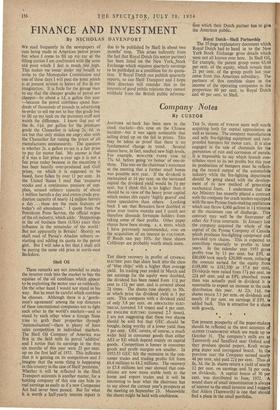FINANCE AND INVESTMENT
By NICHOLAS DAVENPORT WE read frequently in the newspapers of cuts being made in American petrol prices but when I come to fill up my car at the filling station I am confronted with the same old price which I feel is much too high. This makes me swear under my breath to write to the Monopolies Commission and one of these days 1 will post the letter which is at present written in letters of fire in my imagination. It is futile for the garage man to say that the cheaper grades of petrol are cheaper—by about a ld. a gallon this year —because the petrol combines spend hun- dreds of thousands of pounds in advertising in' order to tell me not to buy this grade but to fill up my tank on the premium stuff and watch the difference. I know that out of the 4s. 64d. per gallon for the premium grade the Chancellor is taking 2s. 6d. in tax but that only makes me angry also with the Chancellor for raising the prices of all manufactures unnecessarily. The question is whether 2s. a gallon ex-tax is a fair price to pay for motor fuel. My answer is that if it was a fair price a'year ago it is not a fair price today because in the meantime it has been heavily over-produced and Gulf prices, on which it is supposed to be based, have fallen by over 11 per cent. In the United States I read that 'excessive stocks and a continuous pressure of sup- plies, unused refinery capacity of about 1 million barrels a day and excess crude pro- duction capacity of nearly 11 million barrels a day ... these are the main features of today's oil abundance.' I quote from the Petroleum Press Service, the official organ of the oil industry, which adds: 'Happenings in the oil business there (USA) exert their influence in the remainder of the world.' But not apparently in Britain! Shortly we shall read of Persia's Abadan refinery re- starting and adding its quota to the petrol glut. But I will take a bet that I shall still be paying the same old price in north-west Berkshire.
Shell Oil These remarks are not intended to make the investor rush into the market to buy the equities of the oil combines which appear to be exploiting the motor user so ruthlessly. On the other hand I would not stand in his way. But he must be careful which combine he chooses. Although there is a 'gentle- man's agreement' among the top directors of these international companies not to fight each other in the world's markets—and to stand by each other when a foreign State tries to grab their properties through `nationalisation'—there is plenty of keen sales competition in individual markets. The Shell Oil Company of America was first in the field with its petrol 'additive' and I notice that its earnings in the first six months of this year were 25 per cent. up on the first half of 1953. This indicates that it is gaining on its competitors and I imagine that the same thing is happening in this country in the case of Shell 'premium.' Whether it will be reflected in the Shell Transport accounts is another matter, for a holding company of this size can hide its real earnings as easily as if a new Companies Act had never been passed. But for what 'It is worth a half-yearly interim report is due to be published by Shell In about two months' time. This arises indirectly from the fact that Royal Dutch (its senior partner) has been listed on the New Yorlc....Stock Exchange which requires quarterly earnings to be published as a condition for its quota- tion. If Royal Dutch can publish quarterly reports, so can Shell Transport and I hope their directors will consider that in the interests of good public relations they cannot withhold from the British public informa- ion which their Dutch partner has to give the American public.
Royal Dutch—Shell Partnership The 35-page explanatory document which Royal Dutch had to hand in to the New York Stock Eichange gives details which were not all known over here. In Shell Oil, for example, the parent group owns 65.44 per cent. of the equity, which reveals that 21 per cent. of the group profit last year came from this American subsidiary. Tho partners of this combine share in the income of the operating companies in the proportion 60 per cent. to Royal Dutch and 40 per cent. to Shell.


































 Previous page
Previous page